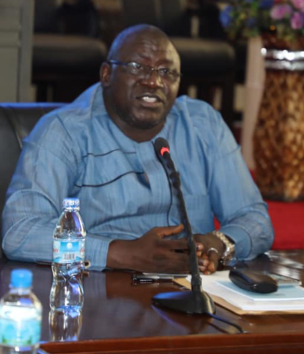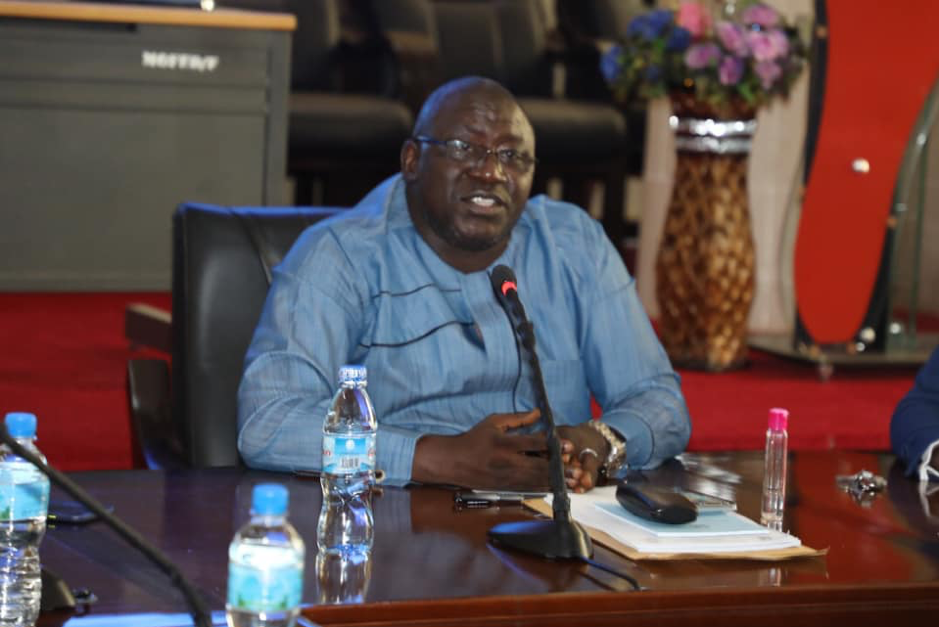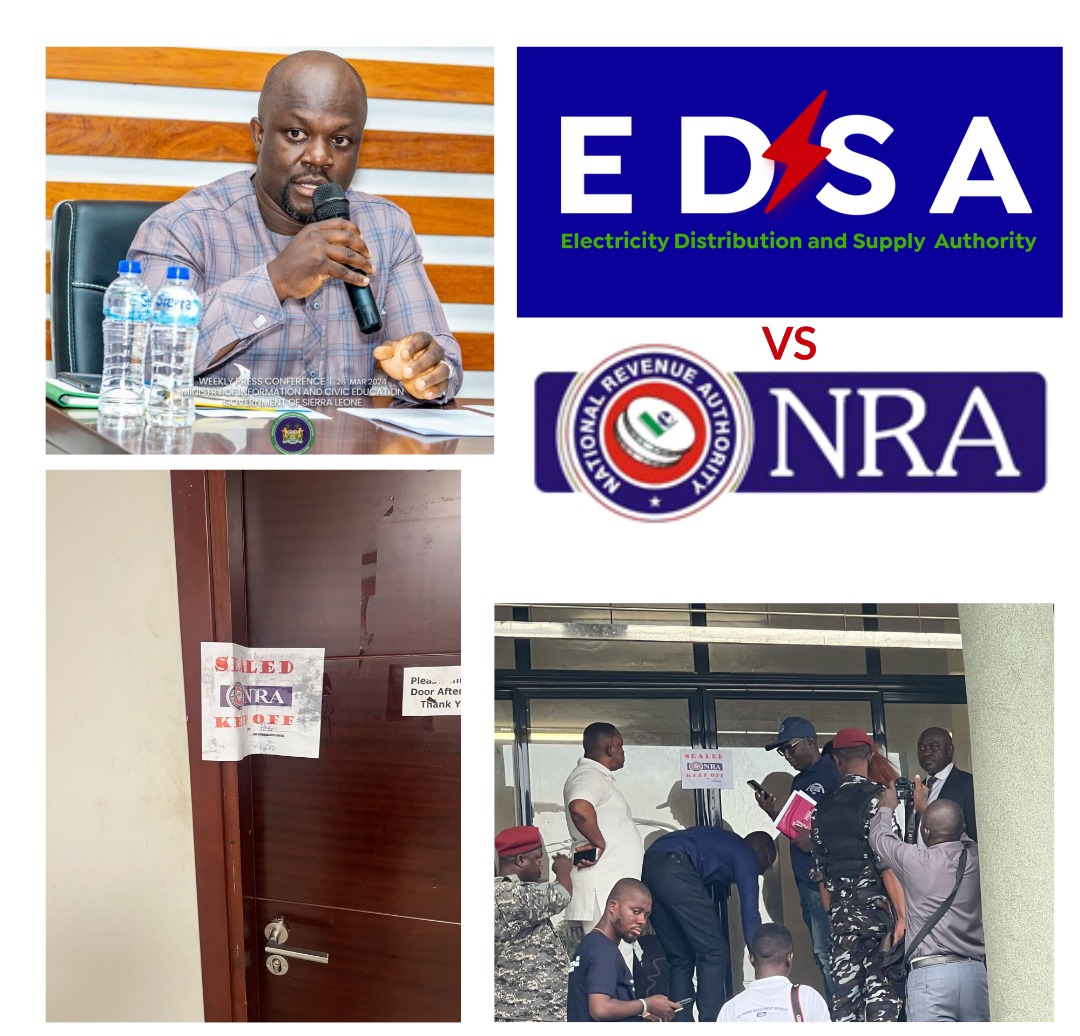
In Sierra Leone, the right to national identity is enshrined in the 1991 constitution and is a fundamental human right tied to other rights and entitlement to some services provided by Government. An Integrated National Civil Registration System, as established by law in the National Civil Registration Act of 2016, provides for the issuance of multi-purpose National e-Identity Cards that can be used by Citizens and non-Citizen residents in all areas where identity verification is required.
However, for personal gains, the Director General has deliberately been giving various excuses to the people of Sierra Leone for ID cards but to this date, there is no ID card for the people for almost 3 years. He has always concealed his greed to make money by stressing on Verification of personal Details. This involves a lot of money and procurements, thus through it he can allegedly make money. But try to wonder why there are 17 NCRA offices in the 16 Administrative districts. Since becoming the Director General, if he had engaged his staff to be carrying out the verification don’t you thing by now majority would have verified their details and given ID cards? But this will be explained in the writeups following this.
The United Nations guidelines on Civil Registration and Vital Statistics (CRVS) stipulates that Civil Registration Systems need to be organised such that the registration covers the entire country and every citizen and non-citizen resident in that country. Sierra Leone, in trying to meet the UN Guidelines, the Parliament passed an act in June 2016 to create the National Civil Registration Authority (NCRA). The mandate of NCRA according to the 2016 Act is to register all citizens and non-citizens resident in Sierra Leone. In addition, NCRA is to register all vital events (including Births, Deaths, Marriages, Adoptions, Nullities and Separations) on a Continuous, Permanent, Compulsory and Universal basis at the chiefdom and ward levels across the country. As stipulated in its Act, to use the data to generate a National Identification Number (NIN) for every citizen and non-citizen resident in Sierra Leone and to issue the National Identity Card.

Now let us examine our NCRA since its inception after the enactment of the June 2016 Act; what it has achieved so far, whether we are in the making progress as expected with all the resources (Government of Sierra Leone and Donors) pumped into it. This writeup is going to focus on the objectives and functions of the Authority and assess the achievements and failures since its inception.
The Objective of the Authority:
The objects for which the Authority is established shall be to:
a. Develop and maintain an accurate electronic database of the population of Sierra Leone;
b. Issue National Identification Numbers to every citizen and resident in Sierra Leone;
c. Provide accurate information about civil status events such as births, adoptions, marriages, divorces and deaths;
d. Provide accurate information about the demographic distribution throughout Sierra Leone, the rate of social change and civil status trends;
e. Facilitate study and research for social development;
f. Provide easy access to the Civil Registration System by other ministries, departments and agencies to enhance the standard of decision-making and public administration;
g. Promote access to information and support the democratic process;
h. Enhance national security; and
i. Generate income for government.
The Functions of the Authority
Functions of Authority.
The functions of the Authority shall be to –
a. Implement the objectives of this Act;
b. Ensure compliance with the Act;
c. Assist the Government in the definition of strategic rules, general policies for civil registration and vital statistics;
d. Maintain the national civil registration system for vital statistics at district, regional and national level;
e. Maintain a register of all citizens and non-citizens resident in Sierra Leone;
f. Ensure the establishment of permanent and continuous registration centers as one stop shops throughout Sierra Leone;
g. Provide technical support and represent the Government at international civil registration forums;
h. Ensure compliance with obligations laid down by international agreements and treaties to which Sierra Leone is a party;
i. Impose sanctions to enforce the Act;
j. Carry out such other functions as may be assigned by the Board or necessary for the purposes of the Authority;
k. Issue multipurpose national identity cards, birth certificates, death certificates, marriage certificates, adoption certificates and other identity documents;
l. Undertake continuous process of civil education on civil registration; and
m. Undertake all necessary measures to perform the functions of the Authority specified in this Act.
It is now nearly five years since the NCR Act was established and it is nearly three years since the current administration took charge to steer the NCRA to achieve its objectives by carrying out the stipulated functions. However, despite the much need funds from Government of Sierra Leone and Development Partners pumped into the NCRA, the Civil Registration is yet to see effective start to achieving its objectives. The first two objectives of the Authority are:
a. Develop and maintain an accurate electronic database of the population of Sierra Leone;
b. Issue National Identification Numbers to every citizen and resident in Sierra Leone;
To this day, the NCRA does not have an accurate electronic database of the ENTIRE population of Sierra Leone and therefore cannot issue National Identification Numbers to every citizen and resident in Sierra Leone despite the huge amount pumped by donors and government into its establishment. Consequently, the NCRA cannot give the citizens and residents of this country the much-needed National Identity Card on which majority of the population’s livelihood depends. And yet the donors continue to give their peoples’ taxpayers monies to NCRA??? Don’t you have enquiry minds if really you want to help the people of Sierra Leone? And the President, is it that you are not aware of all these lapses on the part of the Management of NCRA and you still maintain the leadership coming to elections?
The greatest challenge in achieving this has been alleged CORRUPTION on the part of the current Director General. All he has been interested in are alleged fake trainings that has not had impact on those trained or the NCRA as an institution.
Following is to throw some light on the issues at play in the NCRA. The European Commission gave an eleven million euros (€11m) to NCRA part of which goes as Technical Assistance. The Technical Assistance Project component covers all engagement areas of the NCRA, including organizational, management, administrative, logistics and all aspects of technical and methodological issues and is to last for three years. The TA Team established a ROADMAP for CRVS in Sierra Leone and presented it to the Director General for its support but for reasons best known to the DG, that roadmap has never been followed. To this day what the DG has focused on is training?? training on what remains the biggest question to answer. For those who may want to think that the DG is only being discredited please go and assess the trainings carried out to know what impact (if ever) it has on those trained. But the reason why training has been the dominant activity at the detriment of real establishment of the Civil Registration System will be discussed later but in short it allegedly gives access to quick money; inflating hall rentals, increasing participants for DSAs, cut deals for the supply of stationery and catering etc.
The Roadmap framework emanated from the need to address one of the key directives of the National Policy on Civil Registration Reform that states the requirement for the NEW Civil Registration (CR) organ to pass through a transitory process. The Policy urges under Section 9.2 that the CR bill to have “transitional provisions” that would enable a smooth shift from the old practice to the new Civil Registration System (CRS)
a. In 2017, the NCRA in a bid to establish Civil Registration started with the registration of voters then followed by Mass Civil Registration which was the wrong direction for Civil Registration.
b. Since the registration started, issuance of National Identity Card was stopped in the hope of giving out a multi-purpose National Identity Card. To this day people are struggling for Identification Documents especially the masses that are not working or attending institutions.
c. The Technical Assistance team proposed that whilst trying to establish civil registration on paper (like a house plan) temporary ID cards should be issued to the populace to ease the Identification Problem but the Director General declined the suggestion because he saw it as a counter for his push for expensive chip reading ID Card. The best practice and widely accepted approaches to CRVS; suggested by the EU Technical Team is for NCRA to re-prioritize the issuance of national ID cards after the establishment of the civil register, i.e. recommend to start with the CRVS structure and then followed by the production of ID card especially when NCRA is pushing for chip reading cards (which is only necessary for the privilege few able to travel or conduct modern business). It seems better to first set foundation for the CRVS system in combination with a manageable process for application-production-distribution-issuance of ID cards that provides the citizens with proof of identity thus the mass civil registration data can be used for such till CRVS is set up. In a later stage the Government, when the CRVS system is fully functional and data sharing is established, can decide to upgrade to a high-end card (i.e., ECOWAS). This would keep the initial costs low, while introduction of the multi-functional card model can be connected to data sharing and the need for a broader use within the public administration. At that point it would be easier to explain the need for a more expensive high-end card than it is at the moment.
However, despite all these observations and caution, the Director General is still allegedly bent on providing high-end multipurpose ID cards that involves more money and will have the potential for backlash especially considering:
d. The data at hand has been proven to contain errors since 2017
e. People have never paid for ID cards connected to voting and therefore it will disenfranchise many
f. The system has not been developed for such action.
The reason for this push is because though its procurement process, the DG can allegedly make a lot of money. For example, there is no company in Sierra Leone that can produce the type of ID card the DG is pushing for, therefore it has to be international bidding. Currently, he has allegedly manipulated the procurement process to a point that SMRT (represented by Esham Mackay) for a deal struck by with the DG.
SMRT is a company that was hired to set up the Civil registration ICT infrastructure in 2017. However, what they set up was allegedly not adequate for Civil Registration. Therefore, it was suggested that the ICT builds its own system with the help of the TA team because SMRT still has control of the system and holds the source code. Without the source code, NCRA cannot modify the system without calling the SMRT and every time they call SMRT it is at a cost from which the DG allegdly gets his own kickbacks. There was a suggestion to scrap the SMRT and try to build NCRA self-owned Civil registration System but because of the alleged kickbacks, the DG has put an argument in favour of maintaining SMRT. Despite that, to this day, SMRT is to relinquish the source code.
…to be continued in the next edition.
All efforts to get the side of the Director General proved futile. See next edition for more details.



